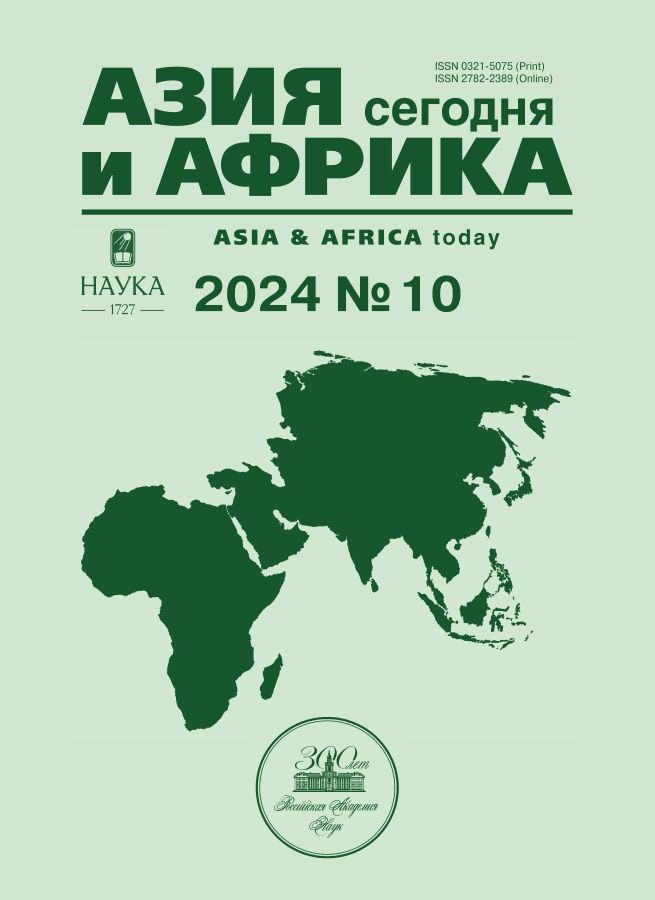Foreign Policy of North African and African Horn States in Contemporary World International Relations
- Authors: Tkachenko A.A.1, Tkachenko K.A.1
-
Affiliations:
- Institute for African Studies, Russian Academy of Sciences
- Issue: No 10 (2024)
- Pages: 25-32
- Section: Politics, economics
- URL: https://ter-arkhiv.ru/0321-5075/article/view/647460
- DOI: https://doi.org/10.31857/S0321507524100033
- ID: 647460
Cite item
Abstract
The article includes analysis of regional vector of foreign policy of North Africa and African Horn States over 21st century in connection with the world mega-trends of development of the human civilization such as globalisation processes, forming united World, including united information space, permanent scientific-technical revolution, more active role of young people and women in economy, social renovating as well as in reforming political life, etc. On the whole, for the past 5 decades the shifts in economic development, in social sphere and results of political reforms have been limited (but anyone could say that this is just the beginning). This article is devoted to the analysis of the main factors of various nature influencing the regional vector of the foreign policy of the North African and African Horn countries. The results obtained through several steps that have been made on the way of modernization had influenced foreign policy but not terminated some conflicts the more serious and more painful problem. The historical gap between two epochs, namely colonial and postcolonial, gave birth to some obstacles, which are difficult or even impossible to overcome during short or medium perspective bearing in mind the strong external dependency of the countries of North Africa and the Horn of Africa. The latter could not disappear instantly. This is the problem for the whole epoch that is full of contradictions and controversial trends.
Keywords
About the authors
Alexander A. Tkachenko
Institute for African Studies, Russian Academy of Sciences
Email: alexander.tkachenko@inafr.ru
ORCID iD: 0000-0003-4121-4665
PhD (Economics), Head, Center for North Africa and African Horn Studies Moscow, Russia
Konstantin A. Tkachenko
Institute for African Studies, Russian Academy of Sciences
Author for correspondence.
Email: konst.workbox@gmail.com
PhD (Economics), Researcher, Center for Global and Strategic Studies
Moscow, RussiaReferences
- Васильев А.М., Кукушкин В.Ю., Исаев Л.М., Ткаченко А.А., Жерлицына Н.А. Ситуация в Ливии и интересы России. Азия и Африка сегодня. 2020. № 6. С. 4-13. doi: 10.31857/S032150750009872-1
- Костелянец С.В. Бессмысленная война в Судане. Типология, причины, последствия. Международная конференция африканистов. Новый миропорядок: от наследия колониализма к суверенитету и развитию. Москва, 23-25 мая 2024. Тезисы. С. 169-170.
- World Bank. World Development Indicators. 2023. NY. UN. Economy. 4.2; The World Factbook. Algeria, Ethiopia, Libya, Morocco, Sudan, Somalia, Tunis. 2022. cia.gov/the_world_factbook/ (accessed 24.09.2023); World Bank. Global Economic Prospects. January 2023. Middle East and North Africa. Pp. 75-82. https://openknowledge.worldbank.org/server/api/core/bitstreams/254aba87-dfeb-5b5c-b00a-727d04ade275/content; Muldering M.C. (2013). An uncertain future: Youth frustration and the Arab Spring. The Pardee Papers. № 16, Boston University.
- International Labour Organization, Key Indicators of the Labour Market. 27; Handoussa H., Tzannatos Z. Employment Creation and Social Protection in the Middle East and North Africa: The Third Mediterranean Development Forum. Cairo: American University in Cairo Press, 2002. P. 247.
- Ломова А.А. Перспективы развития китайско-африканских отношений (по материалам Шестого форума сотрудничества «Китай-Африка). https//cyberleninka.ru/article/perspectivy-razvitiya-kitaisko-africanskih-otnosheniy-po-materialam-smi (accessed 20.11.2023)
- Субботин И. США и Турция усиливают военное присутствие в Сомали. НГ. 22.02.2024.
Supplementary files










